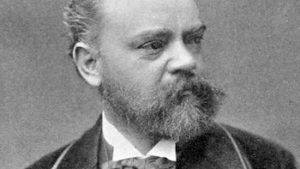
Antonín Dvořák
*Antonín Dvořák was born on this date in 1841. He was a white-European Czech composer and advocate of American Black Spiritual Music.
Antonín Leopold Dvořák was born in Nelahozeves, near Prague, in the Austrian Empire, and was the eldest son of František Dvořák and his wife, Anna, née Zdeňková. František worked as an innkeeper, a professional player of the zither, and a butcher. Anna was the daughter of Josef Zdeněk, the bailiff of the Prince of Lobkowicz. Young Dvořák took organ, piano, and violin lessons from his German-language teacher Anton Liehmann. Liehmann also taught him music theory and introduced him to the composers of the time; Dvořák had much regard for Liehmann despite his teacher's violent temper.
Following the Romantic-era nationalist example of his predecessor, Bedřich Smetana, Dvořák frequently employed rhythms and other aspects of the folk music of Moravia and his native Bohemia. Dvořák's style has been described as "the fullest recreation of a national idiom with that of the symphonic tradition, absorbing folk influences and finding effective ways of using them." From 1892 to 1895, Dvořák was the director of the National Conservatory of Music in New York City. He began at a then-staggering annual salary of $15,000. The Conservatory had been founded by Jeannette Thurber, a wealthy and philanthropic woman who made it open to women, black students, and white men.
Dvořák's primary goal in America was to discover "American Music" and engage with it, much as he had incorporated Czech folk idioms into his music. Shortly after he arrived in America in 1892, Dvořák wrote a series of newspaper articles reflecting on the state of American music. He supported the concept that African American and Native American music should be used as a foundation for the growth of American music. He believed that through the music of Native Americans and African Americans, America would discover its distinctive national style of music. Here, Dvořák met Harry Burleigh, who became one of the earliest black composers.
Burleigh introduced Dvořák to traditional Black spirituals. A result of their meeting and his research produced Dvorak’s Fifth Symphony in E minor, Op. 95, completed in 1892. Anton Seidl conducted the New York Philharmonic in the first performance of Symphony for a New World on December 16, 1893. He also wrote his most appreciated piece of chamber music, the American String Quartet, during this time. Dvořák's original contract provided three hours of work, including teaching and conducting, six days a week, with four months’ vacation each summer.
The Panic of 1893, a severe economic depression, depleted the assets of the Thurber family and other patrons of the Conservatory. In 1894, Dvořák's salary was cut to $8,000 annually and paid only irregularly. The Conservatory was located at 126–128 East 17th Street but was demolished in 1911 and replaced by what is today a high school. However, shortfalls in payment of his salary, along with increasing recognition in Europe and an onset of homesickness, led him to leave the United States and return to Bohemia in 1895.
On March 25, 1904, Dvořák had to leave a rehearsal of Armida because of illness. The first Czech Musical Festival, in April 1904, had "a program consisting almost entirely" of Dvořák's music (Leoš Janáček was disappointed that none of his music was performed). Seventy-six choral associations from all over Bohemia gathered in Prague, and "sixteen thousand singers" sang Dvořák's oratorio, Saint Ludmila. "Thousands of listeners celebrated" the symphony "From the New World." Dvořák was forced by illness to "take to his bed" and could not attend. Antonín Dvořák died on May 1, 1904, of an undiagnosed cause following five weeks of illness, at 62, leaving many unfinished works. His remains were buried in the Vyšehrad cemetery in Prague beneath a bust by Czech sculptor Ladislav Šaloun.